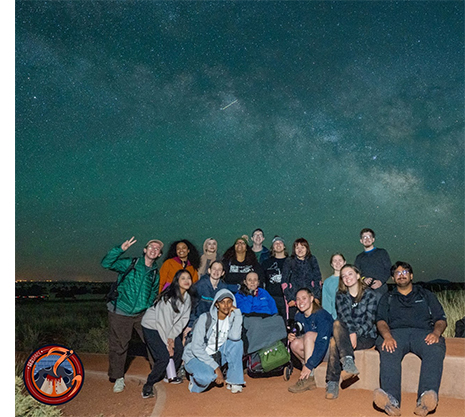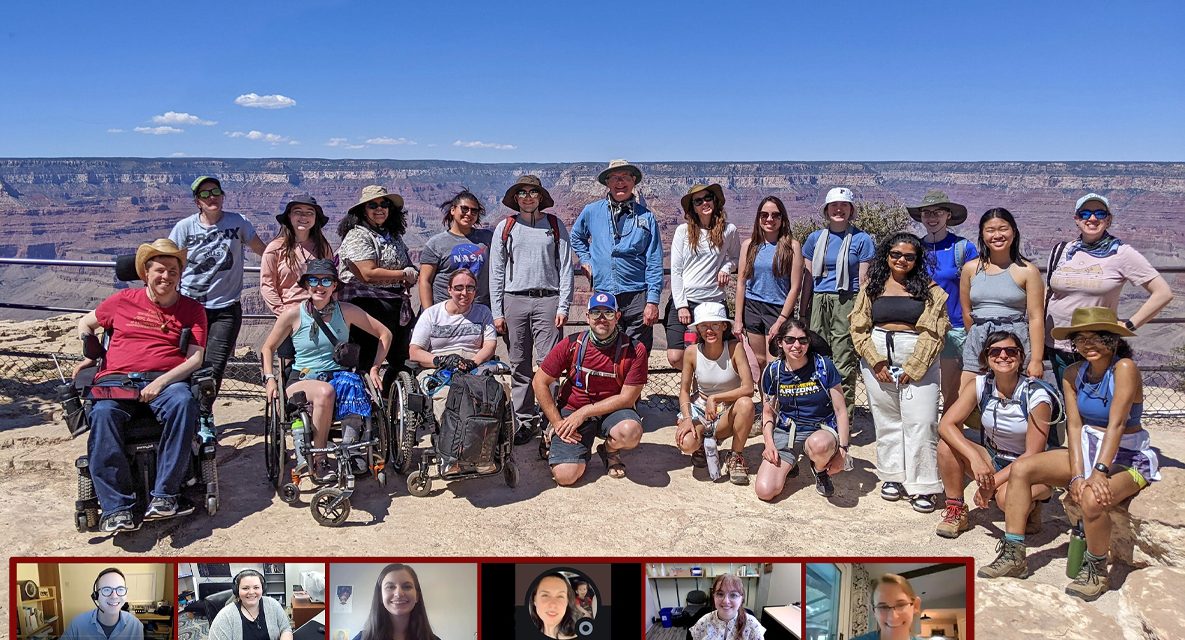Sean Thatcher, Lecturer in the College’s Department of Engineering and Environmental Science, is part of the team receiving the 2025 American Geophysical Union’s (AGU) Award for Advancing Inclusive Excellence in STEM. The award recognizes the work of the GeoSPACE Field Program, where Thatcher serves as Lead Virtual Instructor for the program based on the University of Florida’s campus in Gainesville. Regarded as one of the most prestigious honors in the academic community, the AGU award celebrates organizations and initiatives that are breaking barriers and fostering greater equity, diversity, and inclusion in the sciences.
The GeoSPACE Field Program—short for GeoScientists Promoting Accessible Collaborative Experiences—creates an immersive, hybridized two-week field course for undergraduate and graduate students, especially those from underrepresented backgrounds, to participate in hands-on research, mentoring, and field experiences in the geosciences. Thatcher is one of 10 team members in the program representing seven universities or organizations around the country. He explained how excited he was when asked to join the group in 2019.
“Dr. Anita Marshall (Principal Investigator of GeoSPACE) asked if I would join a team being put together to create an accessible geological field course for students with and without disabilities,” he explained. “I immediately said yes because, as a quadriplegic, developing field-based learning skills, which would have allowed me, or others, to graduate, were incredibly limited at the time. Working with the team that is comprised of faculty with and without disabilities, we shared our life experiences and approaches to field work to create a course that was unavailable to us during our professional training, allowing more students access to field courses with varying abilities that were not present when we needed them most.”

Thatcher’s role in the group since that time has been pivotal. “This course provides students the opportunity to complete their degrees, graduate, and enter the workforce by eliminating a barrier to graduation that typically excludes many individuals from entering the geoscience workforce due to physical limitations, caregiving responsibilities, or other challenges that would prevent them from participating in traditional field courses required in many programs to graduate,” he said.
Thatcher’s involvement not only reflects his own dedication to fostering the next generation of scientists but also shines a spotlight on CSI’s commitment to providing students with innovative, equitable pathways into STEM fields.
Reflecting on the honor, Thatcher noted the broader impact of working with the GeoSPACE team. “Being a part of this team has allowed me to not only build up my professional identity as a geoscientist, but to demonstrate that physical limitations are not a reason why I, or others, cannot participate in the field, utilizing technological approaches that overcome physical barriers and benefit our students’ professional development,” he said. “It’s encouraging to see how much we can accomplish together when we build spaces that allow students to thrive despite perceived limitations, while also providing a community of support to root each other on or come up with clever solutions to physical barriers.”
Thatcher is also humbled by the amazing honor being bestowed to GeoSPACE by AGU. “Receiving this award has been a privilege, especially due to all of the other great work being done in this area by others within the geoscience field,” he noted. “Not only are we motivated to continue the work to provide opportunities to students and grow our unique program, but with this national recognition, the program is poised to expand its impact and reach.”
So far, the GeoSPACE program has worked with approximately 65 students since its inception across the United States, Canada, and the United Kingdom, and Thatcher remains as excited as ever about the program’s future. “We are looking forward to opening applications for the GeoSPACE program very soon to recruit our new cohort of students,” he said. “To make this course accessible and inclusive for as many students as possible, we are also fundraising to offer it at a reduced cost and exploring partnerships with potential sponsors to support students through financial assistance, thereby making the program both sustainable and financially inclusive.”
Those seeking to support the GeoSPACE program can do so here.
About the Award for Advancing Inclusive Excellence in STEM
Presented annually by the American Geophysical Union (AGU), the Award for Advancing Inclusive Excellence in STEM honors individuals, programs, and organizations that demonstrate exceptional commitment to fostering equity, diversity, and inclusion within the sciences. Recipients are recognized for creating opportunities that broaden participation, dismantle systemic barriers, and empower historically underrepresented groups to thrive in science, technology, engineering, and mathematics. Considered one of AGU’s most prestigious honors, the award highlights efforts that not only transform the culture of STEM fields but also inspire meaningful change across academia and beyond.
For more coverage about the AGU’s Award for Advancing Inclusive Excellence in STEM and the GeoSPACE program, read the University of Florida’s announcement of the honor here.














